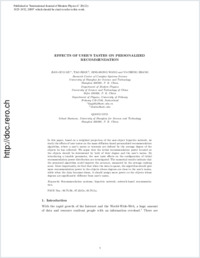Effects of user's tastes on personalized recommendation
- Liu, Jian-Guo Research Center of Complex Systems Science, University of Shanghai for Science and Technology, Shanghai, China - Department of Modern Physics, University of Science and Technology of China, Hefei, China - Department of Physics, University of Fribourg, Switzerland
- Zhou, Tao Research Center of Complex Systems Science, University of Shanghai for Science and Technology, Shanghai, China - Department of Modern Physics, University of Science and Technology of China, Hefei, China - Department of Physics, University of Fribourg, Switzerland
- Wang, Bing-Hong Research Center of Complex Systems Science, University of Shanghai for Science and Technology, Shanghai, China - Department of Modern Physics, University of Science and Technology of China, Hefei, China - Department of Physics, University of Fribourg, Switzerland
- Zhang, Yi-Cheng Research Center of Complex Systems Science, University of Shanghai for Science and Technology, Shanghai, China - Department of Modern Physics, University of Science and Technology of China, Hefei, China - Department of Physics, University of Fribourg, Switzerland
- Guo, Qiang School Business, University of Shanghai for Science and Technology, Shanghai, China
-
2009
Published in:
- International Journal of Modern Physics C. - 2009, vol. 20, no. 12, p. 1925-1932
English
In this paper, based on a weighted projection of the user-object bipartite network, we study the effects of user tastes on the mass-diffusion-based personalized recommendation algorithm, where a user's tastes or interests are defined by the average degree of the objects he has collected. We argue that the initial recommendation power located on the objects should be determined by both of their degree and the user's tastes. By introducing a tunable parameter, the user taste effects on the configuration of initial recommendation power distribution are investigated. The numerical results indicate that the presented algorithm could improve the accuracy, measured by the average ranking score. More importantly, we find that when the data is sparse, the algorithm should give more recommendation power to the objects whose degrees are close to the user's tastes, while when the data becomes dense, it should assign more power on the objects whose degrees are significantly different from user's tastes.
- Faculty
- Faculté des sciences et de médecine
- Department
- Département de Physique
- Language
-
- English
- Classification
- Physics
- License
-
License undefined
- Identifiers
-
- RERO DOC 17085
- DOI 10.1142/S0129183109014825
- Persistent URL
- https://folia.unifr.ch/unifr/documents/301486
Statistics
Document views: 218
File downloads:
- pdf: 145
